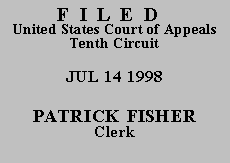

Plaintiffs-Appellants seek reversal of an order of the district court
dismissing their Federal Tort Claims Act suit against the United States. Plaintiffs
filed suit in the district court alleging the government committed negligent and
wrongful acts which caused them psychological, financial, and professional harm.
Defendant filed a motion to dismiss which alleged that Plaintiffs failed to
establish jurisdiction and that they failed to state a claim upon which relief may
be granted. The district court, adopting the recommendation of the magistrate
judge, accepted both of Defendant's arguments supporting dismissal of the case
pursuant to Federal Rule of Civil Procedure 12(b). The district court determined
that Plaintiffs' claims fell under the exceptions to the waiver of sovereign
immunity provided by the Federal Tort Claims Act [FTCA] and that they were
also barred by the applicable statute of limitations.
We review de novo a district court's decision to dismiss a cause of action
for failure to state a claim upon which relief can be granted. See Chemical
Weapons Working Group, Inc. v. United States Dep't of the Army, 111 F.3d
1485, 1490 (10th Cir. 1997). The federal courts generally do not have
jurisdiction over claims where the United States is a defendant because the
United States is entitled to sovereign immunity from suit. The FTCA waives the
United States' sovereign immunity from suit in certain circumstances. See 28
U.S.C. § 2674. However, the FTCA includes exceptions to this waiver,
establishing circumstances under which sovereign immunity is not waived. See
28 U.S.C. § 2680(h). Section 2680(h) excepts from the waiver of sovereign
immunity "[a]ny claim arising out of . . . misrepresentation, deceit, or
interference with contract rights." Id. We agree with the district court that
Plaintiffs assert claims arising from an alleged breach of contract and negligent
misrepresentations made by government employees. We hold their complaint was
properly dismissed pursuant to Federal Rule of Civil Procedure 12(b)(1).
Because we hold that Plaintiffs' claim was properly dismissed pursuant to
Federal Rule of Civil Procedure 12(b)(1), we do not address the district court's
determination that Plaintiffs' claims were barred by the applicable statute of
limitations.
AFFIRMED.
Entered for the Court
Monroe G. McKay
Circuit Judge
*. This order and judgment is not binding
precedent, except under the
doctrines of law of the case, res judicata, and collateral estoppel. The court
generally disfavors the citation of orders and judgments; nevertheless, an order
and judgment may be cited under the terms and conditions of 10th Cir. R. 36.3.
MALCOLM F. DUVALL and
ELEANOR J. DUVALL,
Plaintiffs - Appellants,
v.
UNITED STATES OF AMERICA,
Defendant - Appellee.
Before ANDERSON, McKAY, and
LUCERO, Circuit Judges.
After examining the briefs and the appellate record, this panel has
determined unanimously that oral argument would not materially assist the
determination of this appeal. See Fed. R. App. P. 34(a); 10th Cir. R. 34.1.9. The
case is therefore ordered submitted without oral argument.
Click footnote number to return to corresponding location in the text.
![]() | Keyword |
Case |
Docket |
Date: Filed /
Added |
| Keyword |
Case |
Docket |
Date: Filed /
Added |
![]() (12032 bytes)
(12032 bytes)
![]() (7707 bytes)
(7707 bytes)
Comments to: WebMaster,
ca10 [at] washburnlaw.edu.
Updated: July 15, 1998.
HTML markup © 1998, Washburn University School of Law.
URL: http://ca10.washburnlaw.edu/cases/1998/07/98-4019.htm.